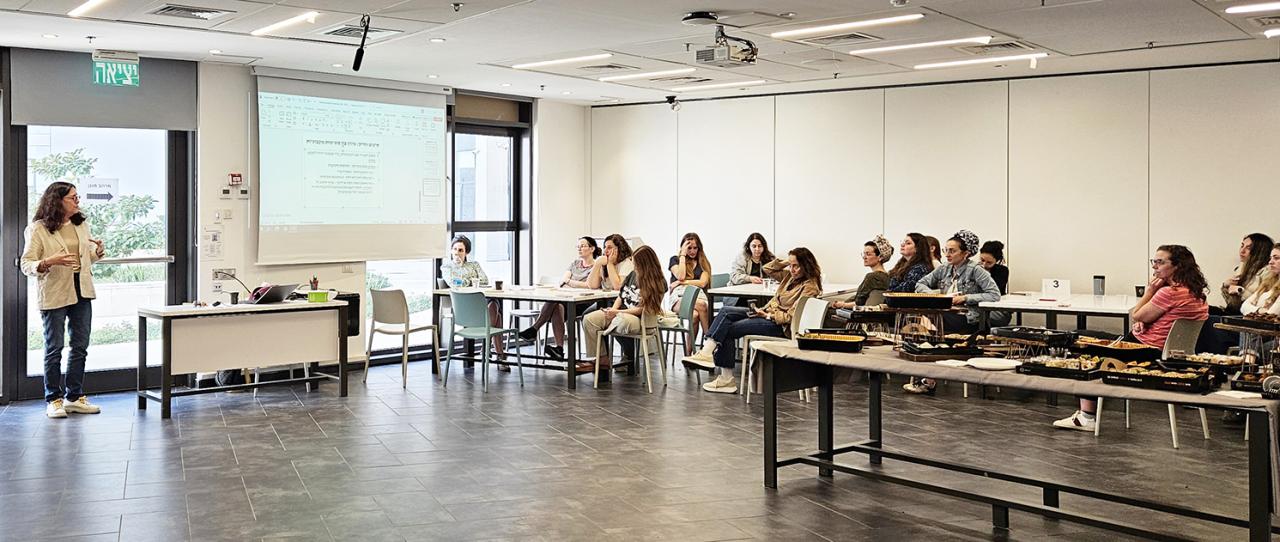Shengineers: Woman's Day at the Faculty of Engineering

In celebration of Women’s Day, the Faculty of Engineering held an event for female graduate and postgraduate students with discussion groups on networking, industry ties, and work-life balance
The Faculty of Engineering marked Women’s Day with a special event for female graduate and postgraduate students. Orchestrated by Dr. Mor Weiss, the event began with a hearty brunch and a coffee cart. After a short icebreaker, participants were divided into small discussion groups. Each group was headed by a member of the academic staff.
The Industry Ties group was headed by Dean of the Faculty, Prof. Orit Shefi. Participants discussed the pros and cons of academia vs. industry (for example, the fact that the industry often offers greater resources, but sometimes lacks a ‘bigger picture’ perspective and less flexible research deadlines and time management in general). The participants also raised areas that can foster a link between industry and academia, for example, startup companies that rely on academic research, or patenting. They also agreed that there is no pressure to decide now whether to pursue academia or venture into the market – there is always time to make that decision later on. In addition, it was reiterated that classmates and academic peers are the very core of industry ties, and the importance of cultivating relationships was highlighted.
The Networking group was headed by Dr. Hila Chalutz-Ben Gal. The first question that was raised was why this matters. To answer that question, Dr. Chalutz-Ben Gal presented a new study which reveals that men tend to cite other men in academic papers – a fact that negatively impacts the number of citations by female researchers. Networking can therefore improve professional presence. Participants then raised ideas on how to enhance the impact of networking. One such idea was to participate in small conferences or targeted groups, or in conferences that include social activities. For those who struggle with networking, it was proposed to let their conversation partner talk about themselves, or simply linger so that she can be recognized. In addition, participants proposed ideas for networking events at the Faculty of Engineering, including forming a group for PhD students in their final year, to help each other find jobs; strengthening ties with Faculty alumni; and having a group coffee break every other week.
The Work-Life Balance group was headed by Dr. Tamar Goldzak Mizrahi. Participants expressed their frustration with how, as female research students they alone are in charge of managing their schedule, which means that there is no end to research and other professional tasks. They shared their sense of imbalance between research and other spheres of life and the feeling of “I don’t do anything well enough.” In that regard, many were relieved to find that they were not alone, and that the feeling is shared by all. They were then offered practical tools for coping with the issue, such as planning, order, and organization; defining clear working hours to help with mentally ‘letting go’ of other tasks when working on one specific task; and outsourcing whenever possible. Participants were reminded that sometimes it is best to put down the phone, learn how to ‘let go’ of perfectionism, and take breaks, which are crucial for creativity and promote full focus while working.
The Professional Tasks Balance group was headed by Dr. Adi Makmal. Participants raised the importance of defining tasks so they can be scheduled and prioritized: top-priority tasks are to be handled immediately; those that are neither urgent nor important should be outsourced, if possible; things that are important but not urgent – or urgent but less important – should be prioritized. Important tasks should be scheduled for the times at which we are most efficient.
The group on Working Relationships in the Laboratory was headed by Dr. Yaara Erez. During this discussion, the importance of personal connections was strongly emphasized, both within the research group itself and with other groups. It was recommended to try to choose and work with people we get along with; try to forge friendships in the laboratory or research group, and even strengthen them through team-building activities and dedicated time for social activities beyond work, such as shared lunches. In case problems arise – the group emphasized the importance of communicating them, in order to solve them without creating lingering tensions.
The carefully planned event took into account the wishes of the students themselves. “Last year, we held a panel with outstanding Faculty alumni who pursued either academia or work in the industry. We allowed time for questions from the audience, and there were many. I felt that they would be happy to have the opportunity for one-on-one conversations with faculty members. Therefore, this year I decided that we would hold sessions in small groups, which would foster freer dialogue among the students themselves and with faculty members,” explains Dr. Mor Weiss, the event organizer. “I wrote in advance a list of ten topics that I thought could interest them, we distributed the list and chose the five most popular topics.” Feedback shows that indeed, the event was a great success. See you next year!
Last Updated Date : 27/03/2025



